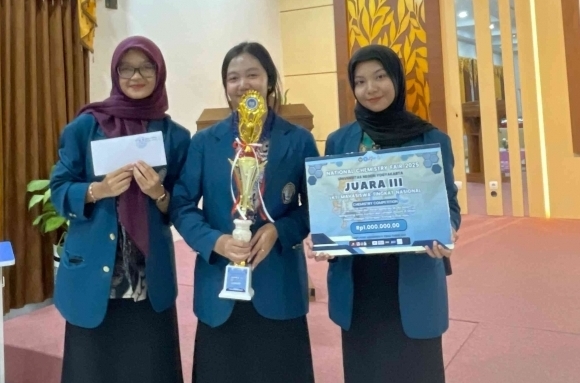Students from the Industrial Chemical Engineering (TRKI) Program of the Vocational School at Diponegoro University (Undip) have once again achieved a remarkable accomplishment at the national level. They won 3rd place in the National Scientific Paper Writing Competition for university students organized by the Faculty of Mathematics and Natural Sciences at Yogyakarta State University (UNY).
The team presented an innovation titled Algae Plast: Integrated System Innovation of Microalgae Bioreactor and Pyrolysis Technology for Transforming Plastic Waste and CO2 into Sustainable Energy Products. The team, consisting of three talented students, was led by Eryka Destiawanti as the team leader, supported by Nur Ilma Awliya and Shervaya Latiffa as members. Together, they succeeded in developing an innovative solution for managing plastic waste and carbon emissions.
Under the guidance of their lecturer, Teguh Riyanto, S.T., M.T., the team was able to design and develop a system that integrates Direct Air Capture (DAC), microalgae bioreactor, and pyrolysis technology optimally. The support and guidance from their mentor were crucial in refining this concept, enabling the team to compete at the national level and achieve this prestigious recognition.
In the competition, the team developed a system that combines Direct Air Capture (DAC) technology, microalgae bioreactor, and pyrolysis reactor to offer a revolutionary solution to the problems of plastic waste and carbon dioxide (CO2) emissions. This technology allows plastic waste and CO2 from the atmosphere to be converted into pyrolysis oil, microalgae biomass, and char (carbon), which can be used as renewable energy.
The AlgaePlast mechanism begins with the use of Direct Air Capture (DAC) technology to capture carbon dioxide (CO2) from the air. The absorbed CO2 is then utilized by the microalgae Spirulina sp in a bioreactor for photosynthesis, producing oxygen that enhances the combustion efficiency in the pyrolysis reactor. In the pyrolysis process, polypropylene (PP) plastic waste is decomposed into pyrolysis oil, hydrogen gas (H), and short-chain hydrocarbons.
“Hydrogen gas (H) and hydrocarbons are then directed to the pyrolysis combustion unit to increase combustion efficiency, while pyrolysis oil is used as an alternative fuel. Furthermore, the microalgae biomass can be processed into health supplements and skincare products. The AlgaePlast concept not only focuses on reducing carbon emissions but also provides tangible solutions for plastic waste management and produces products with high economic value,” said one of the team members.
One of the main attractions of the team’s presentation was their engaging and interactive delivery, which was packaged with humor while still maintaining a serious tone. This approach successfully captured the attention of both the judges and the audience, making AlgaePlast not only a visionary innovation but also one that is easily understood by a wide range of people.
With this success, the team hopes that the AlgaePlast innovation can be further developed and attract the attention of various parties, including industries and the government, to support the implementation of sustainable, environmentally-friendly technologies.
Meanwhile, the Head of the TRKI Program at the Vocational School of Undip, Endy Julianto, stated that this achievement proves that young Indonesians have great potential in creating innovations that will bring change to the environment and the future of energy.
“I hope this achievement can inspire other young people to continue creating and contributing to the nation,” he explained.


Recent Comments